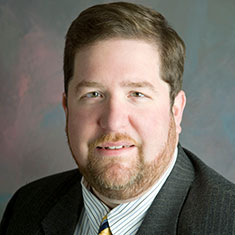Cold case trial marked another legal test for Grinnell alumnus
Apr. 26, 2019 — Twenty five years after Corey Lee Wieneke was murdered in his West Liberty home, a woman approach Muscatine County law enforcement and said as a 9-year old that she overheard Annette Cahill confess to the murder.
All of the sudden a Grinnell College alumnus was in charge of prosecuting a cold case that dates back to 1992. Alan Ostergren ‘94 has dedicated his life to fighting for justice in the courts as the Muscatine County Attorney. Along with it, he has faced some difficult cases that will forever stay in his mind.
“When I joined the office as an assistant in 1997, I was aware of this case,” Ostergren says. “Then in late 2017, I learned that there had been new information that had developed by investigators and they had reopened the case, and I worked with them very closely over a period of about six months to relook at everything. We filed that murder charge in late May of last year.”
The case drew widespread media attention in Iowa as fascination grew about trying Cahill 27 years after her alleged crime. On March 12, a Muscatine County jury could not reach a unanimous conclusion on the possible verdict, so a mistrial was declared. That result means additional work for Ostergren, who is now preparing for a retrial this fall.
The cases involving violent crimes – like this one – can be the most challenging ones. Ostergren says he must find ways to cope.
“When I started, it was hard because you interact with people who are the victims of horrific crimes and what you have to quickly learn as a prosecutor is that you can’t stop caring about them as people,” he says. “But you have to be able to focus on your needs professionally and be involved in their lives and make decisions subjectively about their case. I don’t prosecute people because the victim is really upset. I prosecute people because we have evidence that this person committed that crime, and we’re going to resolve that crime the way we would no matter how upset the victim was.”
 Alan Ostergren ‘94
Alan Ostergren ‘94
Ostergren earned a degree in political science from Grinnell and graduated from Drake Law School. Shortly thereafter, he began working as an assistant Muscatine County attorney before being elected as county attorney in 2010. He won reelection in 2014 and 2018. His primary duty is to ensure that laws are enforced in his county, along with giving advice to the county supervisors on land use, contracts, and human resources.
Ostergren contributes much of his success to what he learned at Grinnell. He says the College also helped him with his law school studies.
“I think academically Grinnell prepared me for law school better than what I realized at the time in terms of writing, research, and discussing issues in class,” Ostergren says. “I don’t think I appreciated how good of an education I was getting at the time and looking back at it, I didn’t realize what a rich, intellectual preparation it was during those four years on campus. Law school was hard, but it was not as hard as it would have been without having developed and exercised my brain at Grinnell.”
Unfortunately, there was another murder in 1992 that influenced Ostergren. Grinnell student Tammy Zywicki ’93 went missing and was later found dead.
“That experience on campus really made me think about life a lot,” he says. “It really pointed me in the direction that I wanted to go into law enforcement. It certainly really made me focus on this cold case. She was an acquaintance at best. I can’t claim she was a close friend at all, but still just to have it happen on a small campus where you didn’t think about the real world all that much really set me on this path.”
Ostergren also finds time to be actively involved in legal organizations. He is a past-president of the Iowa County Attorneys Association and currently on the board of directors for the National District Attorneys Association. He was one of three finalists recommended last year by Sens. Chuck Grassley and Joni Ernst to be the top federal prosecutor in southern Iowa.
“It was a very humbling and rewarding thing to get that call,” he says. “I actually found out when my cell phone rang, and it was Joni Ernst on the phone. She asked could I speak to Alan please? There was a little thing in the back of my head saying ‘Gosh, the voice really sounds familiar.’ Then I realized I was talking to the U.S. senator. It was a really great honor to go through that, then go through the vetting process after that. I would have loved to been appointed, but I wasn’t who the president selected.”
Ostergren enjoys his profession because he gets to tackle many issues, and the job makes a tremendous impact in society.
“One day I can work on a murder, one day I can work on a kind of technical civil problem that the county is involved in, or a tax assessment appeal. It’s an interesting job in that sense,” he says.”
—by Lisa Shapiro
For your information:
Learn more about how Grinnell students interested in legal careers are taking part in the Law Career Community.
To read more alumni news, check out our news archive.